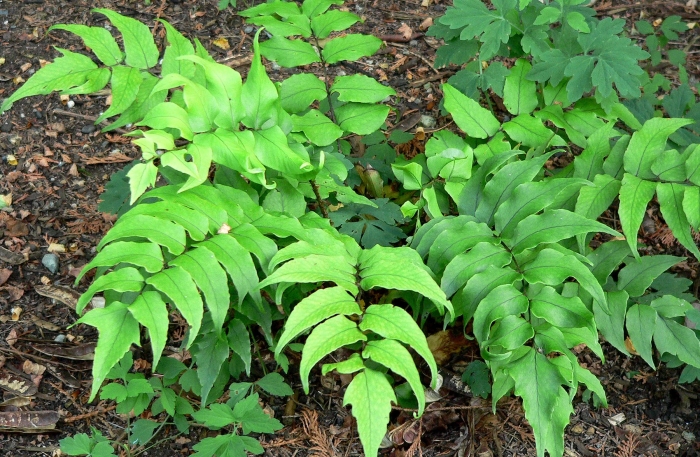Japanese Holly Fern
(Cyrtomium falcatum)
Japanese Holly Fern (Cyrtomium falcatum)
/
/

Stan Shebs
CC BY-SA 3.0
Image By:
Stan Shebs
Recorded By:
Copyright:
CC BY-SA 3.0
Copyright Notice:
Photo by: Stan Shebs | License Type: CC BY-SA 3.0 | License URL: https://creativecommons.org/licenses/by-sa/3.0 | Uploader: Stan Shebs | Publisher: Wikipedia Commons | Title: Cyrtomium_falcatum_3.jpg | Notes: Photo of Cyrtomium falcatum at the VanDusen Botanical Garden in Vancouver |


































































































Estimated Native Range
Summary
Cyrtomium falcatum, commonly known as Japanese Holly Fern, is an evergreen fern native to shaded forest floors and moist, rocky areas in East Asia, including Japan, Korea, and China. It typically grows to a height of 18-24 inches (45-60 cm) with a similar spread, forming dense clumps of arching fronds. The fronds are comprised of six to ten pairs of glossy, dark green leaflets (pinnae), each with a slightly toothed margin and a distinctive holly-like appearance. The underside of the leaflets features sori covered by brown or black indusia, which are important for spore production.
Japanese Holly Fern is valued for its hardiness and lush foliage, making it a favorite for shaded garden areas, woodland settings, and as a houseplant. It is particularly noted for its ability to thrive in deep shade and its resistance to many of the pests that commonly afflict ferns. This fern is also used in floral arrangements and as ground cover in shaded areas. It prefers moist, well-drained, humus-rich soil and benefits from regular watering, though it can tolerate drier conditions once established. While it is easily propagated by spores, division of the rhizome can also be used for faster clonal propagation.CC BY-SA 4.0
Japanese Holly Fern is valued for its hardiness and lush foliage, making it a favorite for shaded garden areas, woodland settings, and as a houseplant. It is particularly noted for its ability to thrive in deep shade and its resistance to many of the pests that commonly afflict ferns. This fern is also used in floral arrangements and as ground cover in shaded areas. It prefers moist, well-drained, humus-rich soil and benefits from regular watering, though it can tolerate drier conditions once established. While it is easily propagated by spores, division of the rhizome can also be used for faster clonal propagation.CC BY-SA 4.0
Plant Description
- Plant Type: Fern
- Height: 1-2 feet
- Width: 2-3 feet
- Growth Rate: Moderate
- Flower Color: N/A
- Flowering Season: Non-Flowering
- Leaf Retention: Evergreen
Growth Requirements
- Sun: Part Shade, Full Shade
- Water: Medium
- Drainage: Fast, Medium, Slow
Common Uses
Bank Stabilization, Border Plant, Deer Resistant, Drought Tolerant, Groundcover, Low Maintenance, Potted Plant, Rabbit Resistant, Rock Garden, Salt Tolerant, Street Planting
Natural Habitat
Shaded forest floors and moist, rocky areas in East Asia
Other Names
Common Names: House Holly-Fern , Japanese Netvein Hollyfern , Ijzervaren , Mahoniabräken , Oni-Yabusotetsu , 도깨비쇠고비
Scientific Names: Cyrtomium falcatum , Aspidium falcatum var. genuinum , Cyrtomium butterfieldii , Polypodium japonicum
GBIF Accepted Name: Cyrtomium falcatum (L.fil.) C.Presl